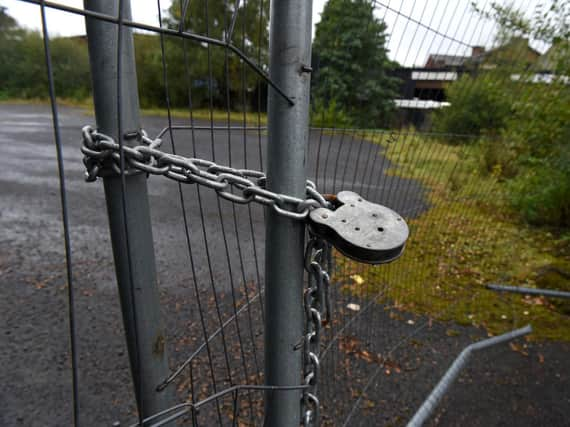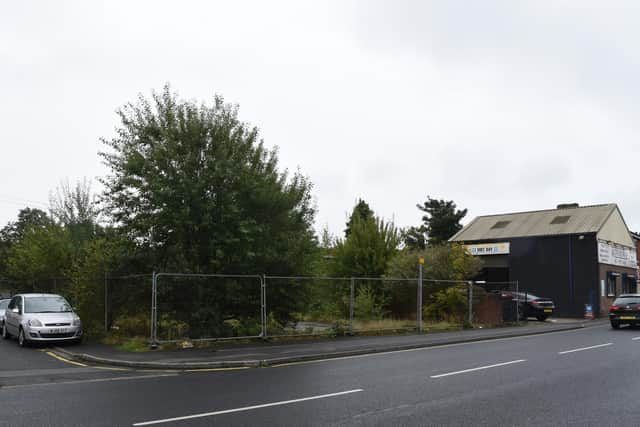South Ribble Council pub deal meant land 'could not be sold for 20 years'


The derelict McKenzie Arms was bought by the council back in 2012 with the intention of it being used as the access point to a proposed housing development on the former Wesley Street Mill, located to the rear of the hostelry.
The £500,000 deal was part of what was an initially a “holistic” plan to regenerate the wider site, papers presented to a meeting of the authority’s cabinet show.
Advertisement
Hide AdAdvertisement
Hide AdHowever, a developer partner was never appointed to make the vision a reality - in spite of council decisions to that effect in both 2008 and 2011 – and, in the face of warnings from a council estates officer about the risk of acquiring the pub alone, the purchase went ahead.


Moreover, the authority also entered into a so-called “overage” agreement, which meant that it would have to make significant payments to the original owners of the pub site should it be sold on at any point within two decades of buying it.
According to the cabinet document, that decision “effectively precluded” the council from offloading the land before 2032.
Council leader Paul Foster said that it had not been the authority’s “greatest day” when it signed the contract under a previous administration.
Advertisement
Hide AdAdvertisement
Hide AdThe details of the deal appear to answer longstanding questions about why the plot has lain derelict since the pub was levelled, only being used for a time as a makeshift car park.
The authority last year agreed to develop 15 high-spec council homes on the site.
Meanwhile, access to the 196 properties being built on the former Wesley Street Mill by developer Countryside Properties ended up being created from Wesley Street itself, instead of from the main Station Road – via the McKenzie Arms site – as per the council’s original plan.
The housebuilder said in 2018 that its “preferred option” had been the Station Road route, but that it had experienced “lengthy delays” in its attempts to acquire the former pub land.
Advertisement
Hide AdAdvertisement
Hide AdAlso that year, a probe was ordered by the then Conservative administration into the circumstances surrounding the purchase on its watch. When Labour took control of the authority in 2019, Cllr Foster pledged that papers relating to the sale would be published “whatever they say” and that the outcome of the investigation would also be made public.
However, he told the cabinet meeting where the summary report was presented that the council was now “not in a position to release” the audit document in full - but assured members that a similar situation "wouldn't and couldn't happen again".
Cabinet member for finance Matthew Tomlinson added: “Some people will continue to ask questions, but we have put as much in this report as we feel we legally can - so hopefully we can move on and tidy up this mess and deliver something fit for the people of South Ribble.”
Conservative opposition group leader Margaret Smith – who was leading the authority at the time of the McKenzie Arms purchase – noted that the move had been a “unanimous decision” of the council’s members back in 2012.
Advertisement
Hide AdAdvertisement
Hide Ad“We have subsequently found that because of the clauses that were put in, we became hamstrung.
“The full [audit] report has some interesting comments in it which are a revelation to me. But nevertheless I am pleased that we will…have some housing and we can make use of that land now,” Cllr Smith said.
The cabinet report outlining the findings of the audit, which was carried out by Lancashire County Council, paints a picture of confusion over how and why decisions were taken – and the degree to which they were scrutinised.
It concludes that the price tag for the pub was “reasonable” - but only insofar as it was the midpoint between a range of different valuations obtained. The County Hall auditor is not a qualified valuer and as the Lancashire Post reported two years ago, property experts at the time of the sale advised South Ribble that the going rate for such a site was £450,000 – but the pub’s owners are thought to have demanded £500,000.
Advertisement
Hide AdAdvertisement
Hide AdThe report states that while the council’s intention was to regenerate a key site within Bamber Bridge, its plans to do so “do not appear to have been adequate, or effectively pursued”.
“The reports to the council do not appear fully to have reflected what officers and external advisers were considering in practice and, conversely, decisions made by the council do not appear to have been adequately enacted by officers,” it adds.
Concern was raised by the authority’s scrutiny committee in 2017 that councillors may have been misled about whether the McKenzie Arms offered the only possible access to the Wesley Street Mill site. Senior officers reviewing the council’s records concluded that there was no evidence to suggest that such a claim had ever been made.
Although the authority commissioned external advisers in connection to the purchase of the pub, it was its own legal team that drafted the contract for the transfer of ownership. Former cabinet member Phil Smith said that lessons were learned within the department at the time.
Advertisement
Hide AdAdvertisement
Hide AdCllr Foster told the Local Democracy Reporting Service after the cabinet meeting that he hoped that the saga would be “the last stone to be overturned by the new administration”.
“We can’t the sell the site, but I think what we have come up with instead – to build the first council houses by this authority in a generation - is a really positive scheme for residents,” he added.
LASTING LEGACY
South Ribble Borough Council’s £2.2m plan for a development of 15 socially-rented properties on the former McKenzie Arms site was granted formal permission last month.
It will see the creation of 12 one and two-bedroomed apartments, split across three blocks, and three two-storey properties – all of which will be built to the energy efficient “Passivhaus” standard.
Advertisement
Hide AdAdvertisement
Hide AdHowever, the restrictive agreement made at the time of the pub purchase still looms large over the future use of the site some eight years later.
That is because the overage payments due to the original owners in the event of a sale of the land before 2032 may be triggered if any of the future tenants initiate the “right to buy” their rented property, as they are entitled to do under longstanding government policy.
Cabinet members were told that the council may need to take out indemnity insurance to the tune of £17,000 to guard itself against that eventuality.
The authority has now begun the search for a contactor to deliver the new estate. As the council does not currently have the in-house capability to manage the homes, it will also seek a partner to look after their day-to-day operation. Given the relatively small number of properties to be created, it has not been deemed cost effective for South Ribble to manage them directly.
Advertisement
Hide AdAdvertisement
Hide AdGrant funding towards the cost of the development will be sought from Homes England. The council had tried to get part of a previous £362,000 grant from the agency redirected towards its planned council housing in Bamber Bridge, but was refused permission as it changed the terms on which the cash had been handed out – and whole sum now has to be repaid.
WHAT IS ‘PASSIVHAUS’?
The German word ‘passivhaus’ translates as ‘passive house’ and is an international design standard which seeks to reduce the amount of energy it takes to heat a home. Average energy bills are £75 in such properties.
The construction methods for each dwelling have to be tweaked until they reach the requirements to be classed as a passivhaus, but common features include triple glazing, copious insulation and a focus on making the building as airtight as possible.
A mechanical ventilation system with heat recovery keeps a constant supply of fresh air to passivhaus properties and helps retain heat.
Advertisement
Hide AdAdvertisement
Hide AdHeating is still required, but at a much lower level. Residents also have to get used to how to ‘operate’ their home – by opening windows at certain times and boosting the ventilation system.
Source: homebuilding.co.uk
Comment Guidelines
National World encourages reader discussion on our stories. User feedback, insights and back-and-forth exchanges add a rich layer of context to reporting. Please review our Community Guidelines before commenting.